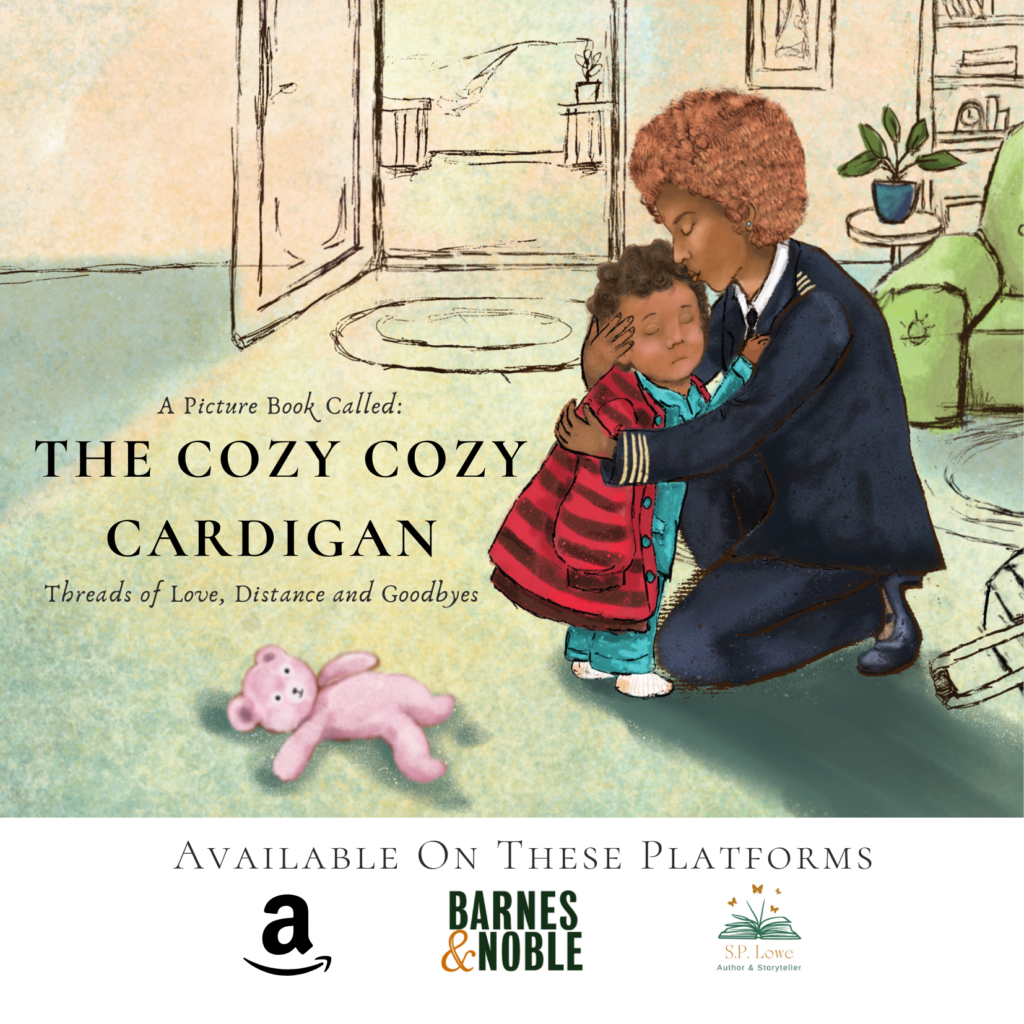Welcome to an insightful journey with S.P. Lowe, a captivating indie author with a heartwarming touch. Situated in the vibrant city of Chicago, S.P. Lowe’s storytelling prowess shines through her latest release, “The Cozy Cozy Cardigan.” Rooted in her Jamaican heritage and fueled by her passion for nurturing young minds, Lowe’s literary journey offers a unique blend of universal themes, including love, resilience, and the enchantment found in everyday moments. Join us as we delve into the inspiration behind her latest work, her journey as an emerging voice in children’s literature, and her exciting future endeavors.
What inspired you to write “The Cozy Cozy Cardigan: Threads of Love, Distance, and
Goodbyes”?
I would say the main inspiration behind writing “The Cozy Cozy Cardigan” was my mother. She
passed away five years ago. One of the earlier drafts of the book was a story that would help
children navigate the emotions around grief, especially with losing a parent, but I was never
happy with how it sounded. Instead, I wrote about a temporary leaving instead of a permanent
one.
How did your experience as a Jamaican immigrant influence your perspective in writing this
book?
Our culture is very much all about tough love. It is how we were raised. It worked out fine for our
generation, but I believe we do not want to continue with that philosophy in raising our children.
For example, I look at how my older brother is with my nephew; he is gentler than we were
growing up, and they talk about feelings more than I ever did as a kid. So, even though my book
is not profoundly centered around Jamaican heritage, I knew I wanted to help both children and
parents. Parents who may not have known what the signs of separation anxiety were and how to
address it, talk about it, or help their child work through it. Maybe even new Jamaican parents
hoping to break that mold of tough love and embrace more social-emotional learning.
As someone who has worked extensively with children as a nanny, what insights did you bring to
the story regarding separation anxiety?
That experience as a nanny convinced me I needed to write this story; it was what I called a
“second inspiration.” Working in that field, I had a front-row seat and even some battle scars to
show the aftermath of a parent leaving. Whether for work, date night, etc. It doesn’t matter. I was
never enough, and the promise of playing or having fun could never replace a parent in the child’s
eye. When I decided, I was not going to write about grief. It was that experience I called on to
help find the words to describe what a child might be thinking when they watch a parent leave
them behind and provided me with the imagery to express that. For example, “He was anxious
and scared she wouldn’t come back, but he couldn’t find his words, so his tears fell to the floor.”
Can you share a bit about the significance of the cardigan in your book, and how it ties into the
theme of comfort and reassurance?
The cardigan is essential. The mother hand knits the cardigan in the book to help her son cope
with his emotions. The idea here is that because knitting itself is a labor of love, the cardigan is
one of a kind and could be a suitable stand-in for the mother when she has to leave. The level of
comfort that satisfied the son, though, is achieved due to the cardigan imbued with his mother’s
familiar scent, a significant side effect of her spending hours knitting it. Personally, the idea of the
cardigan bringing comfort comes from an old, tattered gray one I wear at work. When I work with
infants, they play with it while feeding or being lulled to sleep. When my mother passed, I cannot
tell you how many times I’ve cried into that cardigan. It was there for me when she could not be. I
am forever grateful for it.
What were some challenges you faced while writing and publishing your book?
My anxiety was a big challenge. I made the mistake of trying to get it traditionally published first,
and receiving those initial rejections almost discouraged me.
I was constantly plagued with negative thoughts on whether the story was good enough, whether
people would like it, etc. If I am being candid, I still have those feelings. I purposely kept the
project from many friends and family because I knew one negative comment or doubt and I would
abandon it and never write another thing in my life.
How did you overcome those challenges, and what advice would you give to aspiring authors
facing similar obstacles?
Therapy, therapy, therapy. I am not kidding. It works. I am aware it is not as accessible as it
should be, so my advice is to ignore the dark voices, the ones that scream the loudest, and focus
on that quiet voice inside you, the one that is usually filled with positivity. I would tell any aspiring
writer to do it! Self-publish that book they rejected and feel great that you’ve put your words into
the world. I have learned not to base my value on the opinion of others, and that is what that
rejection letter is: one person’s opinion. You will find your audience, and someone out there will
love the words you wrote.
In what ways do you hope your book will resonate with families experiencing separation due to
work or other reasons?
I always say my book is not a book to make children feel better. On the contrary, emotions should
be felt and explored. My book will help children find the words for their feelings so they may feel
seen and heard and that parents can understand them. It is a tool to help make separation
smoother, and I hope everyone can benefit from it.
Can you discuss any specific techniques or approaches you used to make the characters and
scenarios relatable to children and parents alike?
I can’t speak for specific techniques. I would have to defer to my illustrator. I only had one
specification about the characters. They are represented as black characters with undeniable
Afro features. I believed this was a vital nod to my heritage and essential for my debut book. On a
deeper level, I think my community does not have enough representation of social-emotional
issues in picture books. I wanted to have a black male figure (The little boy grows up) who is
understanding of his child’s emotional distress and helps in the way his mother taught him. For
me, that was a commentary on breaking the mold and a praise to my brother, who the character
was based on.
What message or lesson do you hope readers take away from “The Cozy Cozy Cardigan”?
I would want everyone who reads “The Cozy Cozy Cardigan” to see not only a heartwarming
story but also one of resilience, tradition, and love. I hope if they need the help of the cardigan
with separation that, they are left with the tools they need to navigate those complex emotions
and if they are just here to enjoy a good story that, my book will show them how one family’s
journey started with a sad little boy who was able to overcome that with the help of an object that
would later become a treasured family heirloom. Showing that a mother’s love can transcend
distance and time.
How do you see your book fitting into the broader landscape of children’s literature addressing
themes of family, love, and separation?
I wholeheartedly believe my book deserves to be on every child’s bookshelf. I might be a little
biased. However, I think at some point in a child’s life or even an adult, we need to be reminded
that even though we can’t see our parents all the time, it does not diminish their love for us. My
book can be a reminder of that. The ending sentence of my book is a perfect example: “Keep
something close that reminds you of me, even if I am not there.” These are universal words of
love, family, and separation.
Lastly, what future projects or endeavors can your readers look forward to from you?
I am currently in the illustration stage of my newest project. “There is a Piggie in my Pocket.” It is
so much different from “The Cozy Cozy Cardigan.” For one, it’s not written in a rhyme but
fundamentally different because while it has a great lesson at the end, it is a funny book. It is also
for an elementary school and above the level audience. I am beyond excited about this project.
I am looking forward to seeing my words come to life.
S.P. Lowe, a captivating indie author, calls the vibrant city of Chicago home, where she
shares her space with a four-legged companion, her cat named Moon. At the age of 32,
S.P. Lowe is not only an emerging voice in the literary world but also a dedicated
psychology student at Northeastern Illinois University, where she delves into the
complexities of the human mind.
Originally hailing from the island of Jamaica and a warm and engaging style, she draws
readers into imaginative worlds that reflect the universal themes of love, resilience, and the
enchantment found in everyday moments.
She has dedicated over a decade to working with and understanding the minds of young
readers. Her passion for nurturing young minds has translated into two previous storybook
releases, ‘A Promise I Made’ and ‘These Hands’. In her newest release, ‘The Cozy Cozy
Cardigan,’ S.P. Lowe weaves a magical tale that transcends generations, exploring themes
of familial love and the enduring power of cherished traditions.
Shyreen Lowe
630-808-2589
[email protected]
Instagram- @s.p.lowe
www.splowe.com







